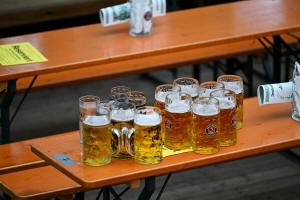Why brewers aren't worried about Wegovy users drinking less beer
 Send a link to a friend
Send a link to a friend
 [November 02, 2023]
By Emma Rumney and Jacob Gronholt-Pedersen [November 02, 2023]
By Emma Rumney and Jacob Gronholt-Pedersen
LONDON/COPENHAGEN (Reuters) - Global brewers AB InBev and Carlsberg this
week played down concerns among some investors that demand for
weight-loss drugs may lead to a sharp drop in beer drinking.
Huge demand for new treatments such as Novo Nordisk's Wegovy has
prompted questions about the implications for a range of industries,
including brewers, and sparked share sell offs in companies involved in
everything from food to healthcare.
Surveys of current users offer some anecdotal evidence that the drugs
dull their appetite for more than just food, with drinks and even
tobacco potentially affected. Some respondents have reported reducing or
cutting out alcohol altogether.
But AB InBev Chief Executive Michel Doukeris likened the concerns to
others, such as how cannabis could disrupt various sectors, which he
said were often short-lived.
"Two years down the road and that conversation is gone," he said in an
interview after AB InBev's results on Tuesday, adding that forecasts
showed beer drinking would rise.
While the world's biggest brewer was watching the data carefully, it was
too limited to draw conclusions, he added.

Carlsberg's new chief executive Jacob Aarup-Andersen said on Tuesday
that the world's third largest brewer had seen no "significant change"
so far as a result of the use of weight-loss drugs, and that retailers
had not mentioned any impact.
"It's early days and we can be proven wrong, but we are relaxed about
it," he told Reuters after a trading update.
Both CEOs said their portfolios include low-calorie and low-carbohydrate
beers, while they also have significant businesses in markets where
obesity is less of an issue than in those where demand for weight-loss
drugs is exploding.
A bottle of AB InBev's Budweiser has around 116 calories, while one can
of its zero-alcohol version has just 46. The World Health Organization
(WHO) recommends a healthy adult should consume between 2,000 and 2,400
calories per day.
The WHO says alcohol consumption is a causal factor in more than 200
diseases, injuries and other health conditions.
As a result, brewers face more immediate threats than weight loss drugs
from regulators and lawmakers which are aimed at limiting consumption,
such as higher taxes and health warnings.
GLASS HALF FULL?
One reason that Wegovy, the first highly effective weight-loss drug to
market, and similar medications have triggered concerns is that they
belong to a class called GLP-1 agonists.

[to top of second column]
|

A view shows mugs of beer during the 188th Oktoberfest, in Munich,
Germany, September 17 2023. REUTERS/Angelika Warmuth/File photo
 These were originally developed to
treat type 2 diabetes, but in addition to controlling blood sugar
levels, they affect hunger signals to the brain and slow the rate at
which a person's stomach empties, making them feel full for longer.
Some clinical trials on rodents have found treatment with GLP-1
agonists reduces alcohol consumption, eases symptoms of alcohol
withdrawal and more.
Clinical trials with humans are limited and largely focused on
people with alcohol use disorder, rather than consumption generally.
A number are still underway.
One trial looking at the impact of a different GLP-1 agonist on
alcohol intake among humans showed mixed results. It decreased total
alcohol consumption for some, but not others.
Nevertheless, some investors are worried about the potential impact
on brewers if such drugs reduce overall consumption.
"You have to drink something, but you don't have to drink beer,"
said Moritz Kronenberger, portfolio manager at Germany's Union
Investment, adding he wants more proactive communication on the
topic from the brewers, and more of their data.
Brewers could try to leverage relationships with big retailers to
access data, Janus Henderson portfolio manager Tom O'Hara said,
although any negative impact was likely to be small given brewers'
diversified footprints and growth prospects.
"They shouldn't be complacent to it but equally they shouldn't worry
too much," O'Hara said.
OVERWEIGHT
With more than 650 million adults worldwide categorised as obese by
the WHO and 1.3 billion more overweight. More than half a dozen big
and small drugmakers are working on products similar to Wegovy.
Since its launch in 2021, Wegovy has been flying off the shelves in
the United States, where 40% of the population is categorised as
obese.

AB InBev has a big U.S. business, but earns more revenue in the
Middle Americas and has a large footprint in countries like Brazil.
For Carlsberg, Asia, driven by China, represents its second-largest
region by revenue, while the Danish brewer does not sell in the U.S.
Such emerging markets often have lower obesity rates, while
weight-loss drugs are unlikely to be available or affordable there
any time soon.
(Reporting by Emma Rumney in London and Jacob Gronholt-Pedersen in
Copenhagen; Editing by Matthew Scuffham and Alexander Smith)
[© 2023 Thomson Reuters. All rights
reserved.]This material may not be published,
broadcast, rewritten or redistributed.
Thompson Reuters is solely responsible for this content. |